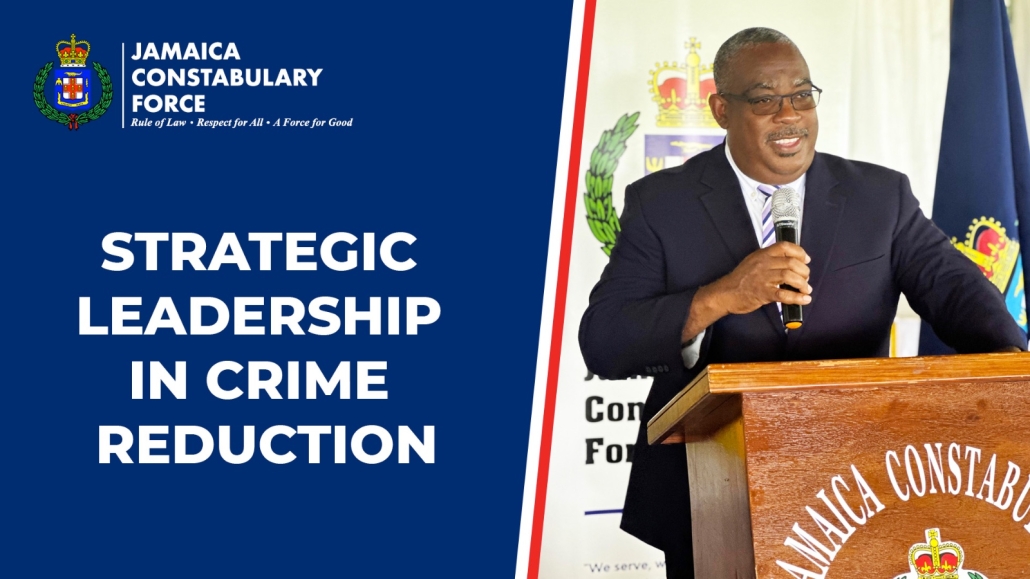 In the intricate and high-stakes world of law enforcement, strategic leadership is both a hallmark of success and the cornerstone of sustainable progress. This week, through the Commissioner’s Corner in the Jamaica Constabulary Force’s (JCF) weekly Force Orders, Deputy Commissioner Richard Stewart offered an insightful perspective on the Force’s strategic priorities. As head of the Crime and Security Portfolio (CSP), DCP Stewart used this platform to address members of the JCF directly, outlining the approaches that underpin the organisation’s efforts to maintain and deepen its crime-reduction gains. His words were a reminder that the fight against crime is as much about adaptability and strategy as it is about courage and commitment.
In the intricate and high-stakes world of law enforcement, strategic leadership is both a hallmark of success and the cornerstone of sustainable progress. This week, through the Commissioner’s Corner in the Jamaica Constabulary Force’s (JCF) weekly Force Orders, Deputy Commissioner Richard Stewart offered an insightful perspective on the Force’s strategic priorities. As head of the Crime and Security Portfolio (CSP), DCP Stewart used this platform to address members of the JCF directly, outlining the approaches that underpin the organisation’s efforts to maintain and deepen its crime-reduction gains. His words were a reminder that the fight against crime is as much about adaptability and strategy as it is about courage and commitment.
One of the key themes in DCP Stewart’s address was the sustainability of the JCF’s recent crime-reduction successes. Acknowledging the understandable concern about whether these gains can be maintained, he offered a candid assessment: “Given that crimes are committed by people this concern is understandable, as people learn, adopt and can create counter measures. We, therefore, must constantly analyse with a view of refining, and sometimes abandoning and adopting new approaches.” This insight reflects the reality that policing is a dynamic endeavour, requiring continuous evaluation and innovation to stay ahead of evolving criminal tactics.
At the heart of the CSP’s approach is the ‘Focus Deterrent High Impact Criminal Initiative,’ a strategy designed to tackle serial crimes with high solvability. “The ‘Focus Deterrent High Impact Criminal Initiative’ is being refined. This strategy is built on the observation that most crimes is serial though the same is not true for criminals,” DCP Stewart explained. By identifying repeat offenders and ensuring their incapacitation through arrest, this initiative aims to disrupt patterns of criminal behaviour. The Violence Producers workbook, a critical output of this initiative, serves as a valuable tool in this effort, enabling officers to track and target individuals who pose significant risks to public safety.
The importance of intelligence-led policing was another focal point of DCP Stewart’s message. He described this model as the foundation for all violence-reduction initiatives, promising three key outputs: defining hotspots, identifying vulnerable individuals, and highlighting subjects for linked investigations. “This model promises three key outputs; defining hot spots, identifying hot and vulnerable people and highlight subjects for linked investigations,” he stated. This approach not only enhances operational precision but also maximizes the impact of the JCF’s resources, ensuring that efforts are concentrated where they are needed most.
The results of this intelligence-driven approach are already evident. The National Intelligence Bureau (NIB) has achieved a 20% hit rate, a figure that DCP Stewart emphasized is significant by international standards. “The National Intelligence Bureau (NIB) is already producing at a hit rate of 20%… In the intelligence community, 20% is good,” he noted. This achievement underscores the importance of investing in intelligence capabilities and fostering a culture of data-driven decision-making within the Force.
Public trust emerged as a recurring theme in DCP Stewart’s address, highlighting its role as both a driver and an outcome of effective policing. “Public trust is strengthened when the encounters and experiences citizens have with the police is courteous, professional and satisfying,” he observed. This acknowledgment is particularly important in the context of Jamaica, where historical and societal dynamics have sometimes strained the relationship between law enforcement and the public. By prioritising quality management systems—including the ISO 9001 certification process—the JCF is taking tangible steps to ensure that every interaction reflects the professionalism and respect that citizens deserve. “The process to obtain ISO 9001 certification ensures that our systems are at a level to produce quality service consistently,” DCP Stewart affirmed.
The ability to inspire and motivate is another hallmark of strategic leadership, and DCP Stewart’s concluding remarks reflected this. “In closing, I share with you the motto of the great institution of learning on St. Johns Road, St. Catherine: ‘Prayer and Work Conquer All,’” he wrote, offering a message of encouragement and faith. His words served as a reminder that success in policing is not just about operational strategies but also about the values and resilience that underpin those efforts.
DCP Stewart’s address, as presented in the Commissioner’s Corner, is reflective the strategic focus and adaptability of the JCF’s leadership. By prioritising intelligence, refining initiatives, and fostering public trust, the Crime & Security Portfolio is addressing the challenges of today while laying the groundwork for sustainable progress. This is leadership that understands the complexities of modern policing and the importance of aligning strategy with execution.
As Jamaica continues its journey towards a safer and more secure future, the JCF’s strategic approach serves as a reminder that effective crime reduction requires courage in the field and vision in the boardroom. Through the efforts of leaders like DCP Stewart and his entire management team along with the dedication of investigators across the Force, the JCF is demonstrating that progress is achievable through strategy, integrity, and a commitment to excellence.







